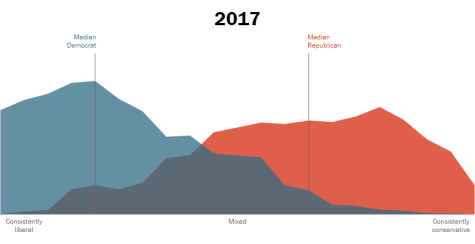The Man Who Broke American Politics

Newt Gingrich
December 12, 2018
American politics were forever changed in 1995, when Newt Gingrich was elected as Speaker of the House. This started a new reign of radicalism, not seen since the Civil War, that broke Congress and created the dysfunctional legislature we know today.
Gingrich’s views on politics came from his views and lessons from the natural world. These gave a primitive and barbaric twist to his ideas. Gingrich saw nature as harsh, competitive, and challenging at every level and thought this was how politics should be.
On June 24, 1978 Gingrich began his plan to change American politics by recruiting younger politicians to his cause, his ideas of politics being mean, nasty, and cutthroat, began to spread, and Gingrich’s “War for Power” began.
In the aftermath of Watergate, many Republican law makers had been removed from office, and Gingrich had a plan, to destroy the bipartisan coalitions. Without them Congress would become dysfunctional, and lawmaking would become a deadlock. Gingrich reasoned that the country would not stand for a dysfunctional Congress and would become frustrated with the Democrats in the House of Representatives, and the Senate would vote Republican, evening the scales.
Gingrich and the Conservative Opportunity Society showed little interest in actual law-making and spent their time in Washington looking for “trouble and cameras.”
He saw the House of Representatives as an arena of conflict and drama and wanted to televise it by setting up talks that were broadcasted; he became famous for his baiting of politicians and insults that started to make Congress remarkably similar to the years leading up to the Civil War.
Gingrich’s tactics had a corrosive effect on Congress, causing it to dissolve into a legislative war. By 1988, Gingrich had what he wanted and was waging war against Congress, scandalizing moderate lawmakers.
By 1989 Gingrich had caused the resignation of Speaker of the House, Jim Wright. While many saw him as an upstart, some saw Gingrich as a revolutionist and his ideas began to spread. He convinced many Republican candidates to sign his “Contract with America” six weeks before the 1994 midterms, stating they would help to pass ten bills and eight reforms if they were elected to Congress. All but two Republicans signed the document. Bill Clinton called the document “The Contract on America” and many on the opposition believed it was just a political ploy.
One of the main goals of Gingrich’s earlier Contract with America was to balance the federal budget, but Republicans in Congress wanted to make big cuts in funding to Medicare, education, and environmental programs. Unfortunately for them, Democrat Bill Clinton had other ideas.
“…Congress has failed to pass the straightforward legislation necessary to keep the government running without imposing sharp hikes in Medicare premiums, and deep cuts in education, and the environment,” said President Bill Clinton.”[it is] unfortunate that the Republican party has brought us to this juncture, because… we share a central goal, balancing the federal budget…. Unfortunately, Republican leaders in Washington have put ideology ahead of common sense and shared values.”
The subsequent government shutdown led to the closing of national parks and museums in addition to 800,000 government workers going unpaid. After 21 days of impasse, the President and Congress finally agreed on a budget to reduce deficit spending and balance the budget by 2002. Gingrich and the Republican party had hoped for the shutdown to be a policy win, but in the end, it resulted in the public blaming them.
Clinton had yet another issue with Gingrich over welfare reform. He accused Clinton of stalling on welfare reform and instead working on universal healthcare. He claimed that the Republican-held Congress could pass a Welfare act in just 90 days.
In 1996, Gingrich finally got his act after the President vetoed two former proposals. Gingrich’s Personal Responsibility and Work Opportunity Act gave states more control over welfare, in addition to setting time limits and making the qualifications for food stamps far stricter.
After making an enemy of the Democratic Party, Gingrich was accused of 84 ethics violations. All but one of the charges were dropped, and in 1997 the House voted 395-28 that Gingrich had to pay the investigation fees of $300,000 for violating federal tax laws and lying to the ethics panel, headed by James M. Cole. In the next election, Republicans lost five seats and blamed Gingrich, asking him to step down from his position as Speaker of the House. In 1999 he retired from Congress for good.











adviser • Dec 13, 2018 at 8:56 pm
Excellent craft. This article is extremely well written. Impressive articulation of information! Thank you!